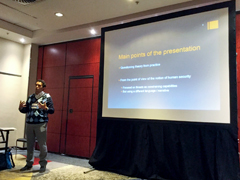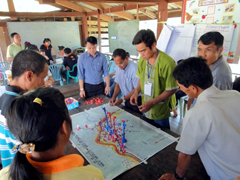JICA-RI Researcher Oscar Gomez Talks About Advancing Human Security and Capabilities at 2017 HDCA
2017.10.06
JICA-RI researcher Oscar A. Gomez presented the results of JICA-RI research at the annual conference of the Human Development and Capabilities Association (HDCA), which explored the theme of “Challenging Inequalities: Human Development and Social Change.” The 2017 Conference was held from September 6-8 at the University of Cape Town, South Africa; this was the first time it has been held on African soil.
On September 7, Gomez co-chaired a session on “Advancing Rights and Capabilities in Practice: Exploring the Realm of the Possible” and gave a presentation titled “Perceptions of Human Security in the ASEAN+3: What do they tell us about advancing capabilities in the real world?”
In his presentation, Gomez discussed the results of the JICA-RI on-going project, “Human Security in Practice: East Asian Experiences,” which examined the perception of the idea of human security and major insecurities in eight ASEAN nations as well as in Japan, China, and South Korea.

JICA-RI researcher Gomez explained the perception of the idea of human security in Asia (Photo: Yuko Kamishima)
Based on the preliminary findings, he explained how, with the exception of Thailand, Philippines, and Japan, the understanding of human security is limited. However, the project researchers often found that the locals did not think human security was foreign, but they had an attitude, which may be thus explained: “we already do human security, we just do not call it that.” Gomez analyzed the latter as human security serving the reason of the state or raison d’etat. Researchers found that human security was included in the constitution and was enforced through the rule of law, suggesting that the state plays a central role in protection.
Furthermore, he said that the recognition of the state’s central role in protection implies a qualification of the nature of the state–society relationship. The research team found a positive view of some form of paternalism, i.e., of depending on the state for protection, related to the importance of safety nets, and welfare policies in general.
Moreover, such reliance on the state has important implications for the understanding of empowerment, he said. This is because empowerment is about the capacities for protection and therefore results in governments becoming stronger and autonomous. In contrast, the common view of empowerment as individuals working out solutions to the threats affecting them was not dominant in the study.
Finally, he said that the project’s survey showed insecurities linked to both the lack of development and development aggression, for example, poverty-stricken areas affected by pollution. This suggests that the trade-offs inherent to development are seen as insecurities and therefore, there is a need to confront them either through human development and capabilities, or human security.
When discussing the implications of these observations, he underlined the importance of an institutional approach to the realization of capabilities, through which we should reinterpret the expression of agency and thus, empowerment.
In closing his presentation, he stressed the need for rethinking the place of liberalism in the capability approach; for instance, questioning whether the advance of capabilities inherently results in the advancement of liberal ideas. This is going to be particularly important as political transformation takes place at the global level.
In the Q&A that followed, a participant from Vietnam commented on how empowerment in her country is actually conceived through the action of the state and stated as to how there seemed to be something different about the advance of capabilities in the region.

JICA supports capacity building for disaster prevention in Thailand

事業事前評価表(地球規模課題対応国際科学技術協力(SATREPS)).国際協力機構 地球環境部 . 防災第一チーム. 1.案件名.国 名: フィリピン共和国.

事業事前評価表(地球規模課題対応国際科学技術協力(SATREPS)).国際協力機構 地球環境部 . 防災第一チーム. 1.案件名.国 名: フィリピン共和国.

事業事前評価表(地球規模課題対応国際科学技術協力(SATREPS)).国際協力機構 地球環境部 . 防災第一チーム. 1.案件名.国 名: フィリピン共和国.

事業事前評価表(地球規模課題対応国際科学技術協力(SATREPS)).国際協力機構 地球環境部 . 防災第一チーム. 1.案件名.国 名: フィリピン共和国.

事業事前評価表(地球規模課題対応国際科学技術協力(SATREPS)).国際協力機構 地球環境部 . 防災第一チーム. 1.案件名.国 名: フィリピン共和国.
scroll